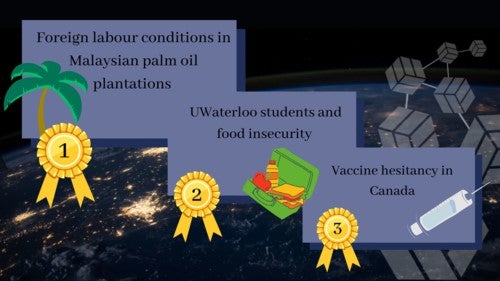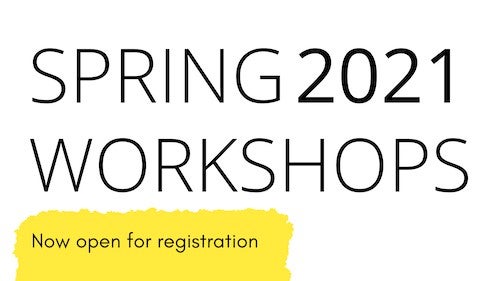Editor:
Brandon Sweet
University Communications
bulletin@uwaterloo.ca
Long-term care infrastructure must be re-imagined in a post-pandemic world

Protecting long-term care residents from outbreaks requires different infrastructure, proper staffing conditions and a culture of quality assurance, researchers have found.
The experts further determined that designing smaller, more homelike spaces would minimize the spread of viruses while promoting better health and quality of life for residents.
“Community outbreaks and lack of personal protective equipment were the primary drivers of outbreak occurrence in long-term care homes, and the built environment was the major determinant of outbreak severity,” said George Heckman, a professor in Waterloo’s School of Public Health and Health Systems and Schlegel Research Chair in Geriatric Medicine with the Research Institute for Aging.
“We need to distinguish between small-scale living and small-scale housing, using architectural features to create uncrowded and home-like spaces – but within a sufficiently resilient infrastructure to avoid critical staff shortages such as those experienced by some very small homes in Italy and the United States.”
In the U.S., data from geospatial analysis and cellphone tracking showed that outbreaks were more likely when staff commuted from neighbourhoods with high viral circulation, and in large homes with more staff traffic.
The researchers said that in the case of Ontario, simulations found that 31 per cent of infections and 31 per cent of deaths could have been prevented if all Ontario long-term care residents had had single rooms. However, 30,000 new private rooms would have been needed.
“Policymakers need to reimagine long-term care infrastructure in a post-pandemic world, keeping in mind that smaller homes support better resident outcomes and are more resilient against infectious outbreaks,” Heckman said. “New large-scale long-term care home developments should be strongly discouraged.”
Other factors that would improve resident well-being and curb the spread of viral infections include a dedicated infection control officer in all long-term care homes, proper staffing conditions and high-quality assurance frameworks.
Hong Kong, for example, learned from the 2003 SARS outbreak and implemented several policies that led to success when it came to COVID-19. They developed guidelines for the prevention of communicable diseases in long-term care, including that all homes have an infection control officer, conduct annual outbreak drills and have a permanent stockpile of personal protective equipment and establish visitation rules that address hygiene and PPE use.
In addition to robust infection control and communication technologies used in Hong Kong, Heckman believes full-time positions, paid sick leave and mental health and well-being supports for staff would make a big difference.
The Hong Kong experience underscores the critical importance of learning health systems, of which a culture of quality assurance is an intrinsic component. Ontario, and most Canadian provinces, already have the required information infrastructure to achieve a learning health system. Based on standardized international Resident Assessment Instrument systems, developed by an international consortium of which Waterloo is a principal leader, their use by communities of practice has led to reductions in inappropriate antipsychotic use and better health outcomes for long-term care residents.
“Reflecting on the COVID-19 Themes from Long Term Care” was published in the Journal of the American Medical Directors Association. The co-authors are Heckman, Kelly Kay, Adam Morris, David Grabowski, John Hirdes, Vincent Mor, Greg Shaw, Sophiya Benjamin, Veronique Boscart, Andrew Costa, Anja Declercq, Leon Geffen, Terry Yat Sang Lum, Andrea Moser, Graziano Onder and Hein van Hout.
Map the System takes Waterloo students around the world

This article was originally featured on the Kindred Credit Union for Peace Advancement website.
Many of Map the System’s 2021 competitors are participating from their homes this year, however that did not prevent the University of Waterloo’s campus finalists from tackling systemic issues on local, national, and global scales. Over 200 students applied to participate this year through the University of Waterloo, representing nearly one fifth of Canadian registrations! On Thursday, April 15, UWaterloo’s top six teams competed for the chance to move on to the Canadian finals. For their research on foreign labour conditions in Malaysian palm oil plantations, Muhammed Ahsanur Rahim, Ewomazino IyanuOluwa Odhigbo and Leah Feor received first prize and the opportunity to progress in the competition.
The virtual setting of Waterloo’s third annual Map the System competition did not dampen the enthusiasm of participating students, faculty and staff. Over 200 students comprising 52 teams of graduate and undergraduate students entered the competition this year, mapping societal problems with guidance from their professors, the Kindred Credit Union Centre for Peace Advancement, and Waterloo’s 2021 Map the System Campus Lead, Thomas Fraser. Under the 2021 theme of “Systems Reset”, students tackled systemic issues in health, climate, economic and social spheres.
Based on the strength of their written submissions, six teams were invited to showcase their work at the live campus finals on Thursday, April 15th, to an audience of Waterloo students, staff, and faculty, as well as their family and friends and this year's sponsors. Local topics included COVID-19 and the Opioid epidemic in Ontario and Student food insecurity at the University of Waterloo. On a national level, teams explored the causes and connections behind Vaccine hesitancy and Work-life conflict in Canada. Finally, two teams focused on systems around the world, reflecting on the incidence of Girl-child marriages in Kenya and Foreign labour conditions in Malaysian palm oil plantations.

Many judges pitched in for this year’s competition, dedicating their time and expertise to determine Waterloo’s top teams. The quick wits of Erin Alexiuk (Waterloo Institute for Social Innovation and Resilience), Brian Doucet (UWaterloo School of Planning), Jennifer King (Mennonite Economic Development Associates) and Roopa Reddy (Conrad School of Entrepreneurship and Business) ensured that participating teams received meaningful opportunities to expand on their presentations during the question and answer period, which supported the selection of this year’s finalists. In addition, this year’s evaluators, Karen Schmidlin, Jonathan Baltrusaitis, Jason Lajoie, Tobias Thielen, Simron Singh, and Paul Heidebrecht dedicated many hours reviewing written submissions leading up to the finals.
Behind the scenes, the judges deliberated with spirit and enthusiasm. With such a vast range of topics and scales, choosing just one team to advance to the Canadian Nationals in May was quite the challenge. Fortunately, multiple awards were announced during the campus final showcase.
Delia Lin, Josée Maurice and Lauren Forrest took home the third-place prize of $500 sponsored by the Waterloo Institute for Complexity and Innovation (WICI) for their research into the causes of Vaccine hesitancy in Canada and possible waysto address it in a culturally-sensitive manner. This team joined the 2021 competition through Professor Simron Singh’s International Development course Methods for sustainable development practice: A systems approach.
The second-place award of $1,000 from the University of Waterloo Council for Responsible Innovation and Technology (CRIT) went to Peace and Conflict Studies (PACS) students Victoria Lumax, Blair Ashford and Jen Collins from Professor Paul Heidebrecht’s Map the System seminar. While exploring Food insecurity at the University of Waterloo, this team identified a gap between student needs and their eligibility for community support. As the highest scoring team with a PACS student, this group also received a prize that is new to the competition this year, leaving with an additional $1,000 sponsored by Owl Practice.
Finally, congratulations to Muhammed Ahsanur Rahim, Ewomazino IyanuOluwa Odhigbo and Leah Feor for their outstanding work learning about the systems perpetuating Precarious conditions for foreign labour in Malaysian palm oil plantations. This team, brought together by Professor Singh's International Development course, received a grand prize of $2,000 donated by the Kindred Credit Union, and will be moving forward in the competition to represent the University of Waterloo in the Canadian finals.
From May 3 to 7, teams from across Canada will be participating in a series of online events as part of the online Finals week. Campus finals may be over, but the Map the System journey has only just begun for Rahim, Odhigbo and Feor. On Tuesday, May 4 they will compete against winning teams from institutions across Canada for the chance to move on to the global Map the System finals in June. Stay tuned in the coming weeks for more updates on this team of University of Waterloo students, and consider cheering them on by attending the Canadian finals.
The Map the System Canada National Finals will take place on May 7 at 3:00 p.m. Here is the link to register to attend this event.
HREI launches spring workshops

Human Rights, Equity and Inclusion has released its spring schedule of workshops, which are available to all current students, faculty and staff. This spring, new, renewed, or refreshed workshops include:
- Listening, Acting and Taking Responsibility in the Anti-Racist Movement
- Responding to Disclosures: How to support a friend who experiences trauma
- How masculine-identifying folks can engage in bystander intervention
- 2SLGBTQ+ Fundamentals
- Radical Solidarity for a Collective Future
Equity-related workshops now include information to help guide participants to the workshop that is right for them by including whether the workshop is considered introductory, intermediate, or advanced.
Link of the day
When and Where to get support
Students can visit the Student Success Office online for supports including academic development, international student resources, leadership development, exchange and study abroad, and opportunities to get involved.
Instructors can visit the Keep Learning website to get support on adapting their teaching and learning plans for an online environment.
Course templates are available within your course in LEARN to help you build and edit your content and assignment pages quickly.
The following workshops, webinars, and events are offered by the KL team (CTE, CEL, ITMS, LIB):
- Independent Remote Course Design Essentials, self-directed, continuous self-enrollment course in LEARN.
- Remote Teaching Support Drop-In, weeks of April 26th and May 3rd
- Getting Ready to Facilitate Online Courses: TA Training, beginning Monday, May 3
- LEARN for TAs (CTE6550), Wednesday, May 5, 10:00 a.m. to 11:30 a.m.
- LEARN for TAs (CTE6550), Tuesday, May 18, 1:30 p.m. to 3:00 p.m.
Employees can access resources to help them work remotely, including managing University records and privacy of personal information. Here are some tips for staying healthy while working from home.
Stay informed about COVID cases on campus by consulting the COVID case tracker.
Whether you’re a student or faculty member, the Writing and Communication Centrehas virtual services and programs to help you with all of your academic writing needs. This term we have added evening and weekend one-to-one appointments with our peer tutors, and our NEW one-to-one workshops, where you can learn the content directly from one of our writing advisors.
- Undergraduates: Work with us to brainstorm, draft, revise, and polish your assignments in one-to-one appointments. Ask questions and learn writing tips at our Instagram Live Q&A sessions, and beat isolation while improving your writing skills at the weekly PJ-friendly writing groups.
- Graduates: Meet with our advisors in one-to-one appointments. Join the online writing community at the Virtual Writing Cafés, learn how to present your work at Speak Like a Scholar, or get moving on your dissertation at Dissertation Boot Camp.
- Faculty and Instructors: Request custom workshops for your courses, join the Waterloo writing community at the Virtual Writing Cafés, or make progress on your article, book, or chapter in one-to-one meetings with our faculty specialist.
Co-op students can get help finding a job and find supports to successfully work remotely, develop new skills, access wellness and career information, and contact a co-op or career advisor.
The Centre for Career Action assists undergraduates, graduate students, postdocs, staff, faculty, and alumni through navigating career services that are right for them. You can attend a one-on-one appointment or same day drop-in session at the CCA for assistance with cover letter writing, career planning and much more. You can also book an appointment online or visit our Live Chat to connect with our Client Support Team. The CCA is here to help you.
If you feel overwhelmed or anxious and need to talk to somebody, please contact the University’s Campus Wellness services, either Health Services or Counselling Services. You can also contact the University's Centre for Mental Health Research and Treatment. Good2Talk is a post-secondary student helpline available to all students.
The Library has published a resource guide on how to avoid information overload.
The Faculty Association of the University of Waterloo (FAUW) continues to advocate for its members. Check out the FAUW blog for more information.
The University of Waterloo Staff Association (UWSA) continues to advocate for its members. Check out the UWSA blog for more information.
The Indigenous Initiatives Office is a central hub that provides guidance, support, and resources to all Indigenous and non-Indigenous campus community members and oversees the university Indigenization strategy.
The Waterloo Indigenous Student Centre, based at St. Paul’s University College, provides support and resources for Indigenous students, and educational outreach programs for the broader community, including lectures, and events.
WUSA supports for students:
Peer support - MATES, Glow Centre, RAISE, Women’s Centre - Visit https://wusa.ca/peersupport to book an appointment
Bike Centre – Will be reopening soon.
Campus Response Team, ICSN, Off Campus Community and Co-op Connection all available online. Check https://wusa.ca for more details.
Food Support Service food hampers are currently available from the Turnkey Desk on weekdays from 7:30 a.m. to 7:00 p.m. in the Student Life Centre. If you have any questions please email us at foodsupport@wusa.ca.
Centre for Academic Policy Support - CAPS is here to assist Waterloo undergraduates throughout their experience in navigating academic policy in the instances of filing petitions, grievances and appeals. Please contact them at caps@wusa.ca. More information is available.
WUSA Commissioners who can help in a variety of areas that students may be experiencing during this time:
- Equity – equity@wusa.ca
- Co-op and Experiential Affairs – coop.affairs@wusa.ca
WUSA Student Legal Protection Program- Seeking legal counsel can be intimidating, especially if it’s your first time facing a legal issue. The legal assistance helpline provides quick access to legal advice in any area of law, including criminal. Just call 1-833-202-4571.
Empower Me is a confidential mental health and wellness service that connects students with qualified counsellors 24/7. They can be reached at 1-833-628-5589.
When and Where (but mostly when)
Healthy Warriors at Home (Online Fitness)
Drop-in to Warrior Virtual Study Halls on Wednesdays from 5:30 p.m. to 7:00 p.m. Come together in this virtual space to set goals and work independently or in groups each week.
Livestream Exercises for Waterloo staff: Join us for an energy boosting Bootcamp or a fast and effective Express Home Workout. Open to UW Staff and subsidized by the Staff Excellence Fund.
Renison English Language Institute continues to offer virtual events and workshops to help students practice their English language skills.
Warriors vs. Laurier Blood Donation Battle. Join your fellow Warriors, donate blood and help us win the Blood Battle against Laurier for a second year in a row. Set up a profile or add the PFL code: UNIV960995 to your account if you have a blood.ca account already. Questions? Contact WarriorsInfo@uwaterloo.ca.
Bibliometrics and Research Impact Community Conference, Tuesday, April 27 to Thursday, April 29, 11:00 a.m. to 4:30 p.m. Register for this online event.
NEW - Gender Pronouns and Cultures of Respect Lecture, Wednesday, April 28, 6:00 p.m.
Copyright and Software, Friday, April 30, 1:00 p.m. to 2:30 p.m. Please register to receive a link to this event on WebEx.
Rupi Kaur Live, Friday, April 30, 9:00 p.m.
English Conversation Circles, Monday, May 3.
Dissertation Boot Camp, Friday, May 7.
Positions available
On this week's list from the human resources department, viewable on the UWaterloo Talent Acquisition System (iCIMS):
- Job ID# 2021-6458 - Account Manager - Central West - CEE - Co-operative Education, USG 10 - 11
- Job ID# 2021-6417 - Administrative Officer - Management Sciences, USG 10
- Job ID# 2021-6408 - Alumni Officer, Student Alumni Bridge - Advancement, USG 7 - 9
- Job ID# 2021-6362 - Associate Director, International Relations - Waterloo International. USG 13
- Job ID# 2021-6385 - Data Scientist - Dean of Mathematics Office, USG 10
- Job ID# 2021-6374 - Financial Coordinator - Optometry, USG 7
- Job ID# 2021-6483 - HR Coordinator - Human Resources, USG 5 - 6
Secondments/Internal temporary opportunities
- Job ID# 2021-6464 - Co-op Student Experience Manager - CEE - Co-operative Education, USG 10
- Job ID# 2021-6455 - Information Systems Specialist (Project Manager) - IST, USG 11 - 13
- Job ID# 2021-6506 - Instructional Digital Media Developer - CEL, USG 8 - 9
- Job ID# 2021-6507 - Learning Technologies Analyst - CEL, USG 8 - 9
- Job ID# 2021-6487 - Online Learning Group Manager - Centre for Extended Learning, USG 10
- Job ID# 2021-6500 - Records Specialist - Graduate Studies and Postdoctoral Affairs, USG 7
- Job ID# 2021-6457 - Student Advisor - West - CEE - Co-operative Education, USG 8 - 9